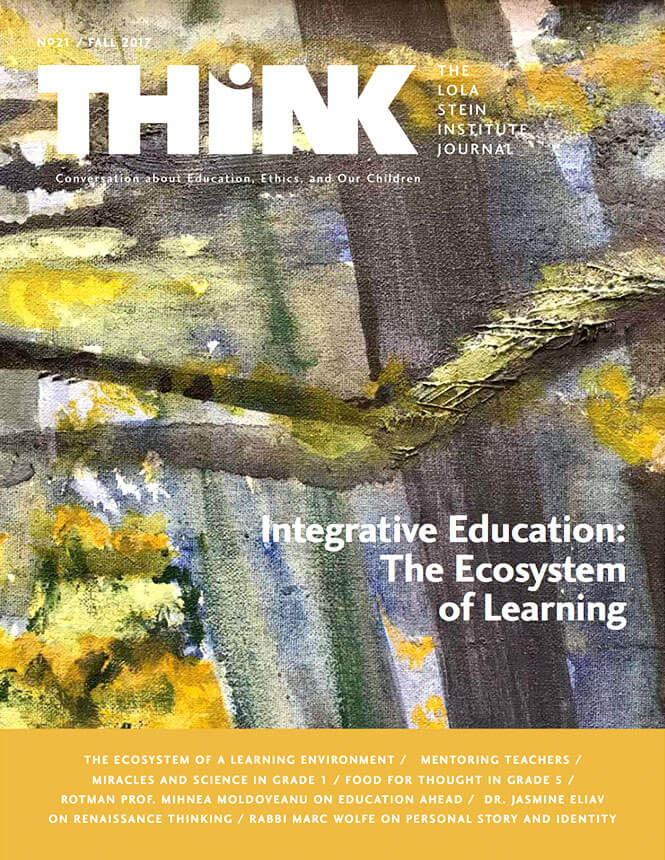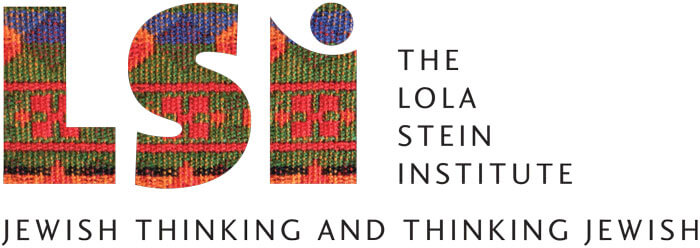- How We Teach

- First Column
- Second Column
- Third Column
- Case Studies

- First Column
- Second Column
- Culture & Community

- First Column
- Second Column
- News & Views

- Admissions

- First Column
- Second Column
- Support Us

- About

- First Column
- Second Column
- Parent Hub
- Attend an Open House
- Take a Tour
- Donate Now
- Calendar
- Blog
- 416-635-1876
- Search
Chaos and Order
The 21st Century Renaissance Thinker
“Breathtaking brilliance” describes the sweep of achievements attributed to Renaissance thinkers; consider Galileo, Leonardo da Vinci. From the 13th to 17th centuries, it seemed that humans had limitless capacity for intellectual, artistic, social, and physical development. Empirical and iconoclastic experimentation ignited an explosion of discovery as seekers foraged beyond the knowledge boundaries imposed by various traditions. Renaissance thinkers pulled meaning and order from the chaos of their own ignorance.
Reflecting on the history of knowledge, it seems to me that the world of information continually presents itself as chaotic, and human beings, at some level or another, endeavour to organize and master it. Ideas, that are first new and then routine, become recognized and differentiated into categories and relationships. The groupings frame how we perceive thoughts and information, and, as such, school systems teach children through the discrete academic disciplines of history, language, math, science, and so on.
Learning methods respect this need for order and organization; like farmers storing grain in silos for later use, the academic disciplines are walled-in stockpiles. For example, mathematics does not pertain to language, nor science to art. What then occurs is that as children grow up and widen their scope of learning, their education becomes increasingly defined and specialized; from high school to university to graduate school or the professions, the higher the learning, the narrower the focus.
We have to ask what risk this gravitation to order may pose? The answer is that classification and definition are methodically constraining our cognitive abilities. The systemization of knowledge, with its tight frames of reference and fragmentation of perspective is so fixed that it is likely impeding freedom of thought. And, furthermore, we have acclimatized to receive information as finite truth rather than intellectual construction.
Thankfully, buzz words in education research today hint at breaking this down; the new language includes “dynamic thinking,” “integration,” and “complex problem solving.” There is a nascent awareness of how entrenched current ways of looking at the world have become. For parents, who are accustomed to traditional academics, a significant related shift has to happen; given that the old ways have been found to inhibit free thought, parents must get comfortable with this challenge to established ways of learning. They need to encourage children to think about thinking!
In the footsteps of the Renaissance, many companies are reinventing how they ask employees to work; they free them from sitting at desks for a set number of hours and go to great lengths to inspire free thought, designing playful office atmospheres, collaboration retreats, and community support systems. The thought is that silo-based work systems likely suppress development and profit. Interdisciplinary brainstorming —strategic and tactical— are a priority in successful businesses.
We want our children, like Renaissance thinkers, to engage freely with complex subject matter and to chart new waters. Schools need to engage with integrative learning. This involves three psychological shifts, the interplay of which will build cognitive, social, and emotional flexibility:
- A Renaissance-type shift that involves intellectual iconoclasm.
- A teacher-training shift that requires customized learning relationships.
- A child-focus shift that embraces child development in all respects.
We want children to construct their identity as learners in a way that frees them from whatever limitations they may have and supports them to play or engage with learning. They need to learn to make sense of information for themselves, and this requires a broad-spectrum educational awakening that will attend to a child’s development across all domains. These psychological shifts are detailed a bit further here.
Flexibility First
First, when we look to see how to promote cognitive flexibility, we note that researchers find that the minds of young children are the most pliable. The spirit of the young child retains a flexible “frame of mind” when he/she is taught across disciplines; the child’s conceptualization of information remains fluid. In his seminar book, Frames of Mind: The Theory of Multiple Intelligences, world-renowned developmental psychologist Howard Gardner challenged us to broaden our conception of intelligence from the singular to the multi-faceted across several domains.[1]
Focus on Teachers
Second, we must attend to how the child’s intelligence is affected by its environment. Celebrated Israeli psychologist Reuven Feuerstein looked at the modifiability of intelligence and underscored the significant influence on a child’s intelligence that teachers can have by mediating information in a positive and meaningful way. This means that the way teacher present information, and the connection they make with their student, critically influences the quality of the child’s learning.
We must evaluate how we present ideas and information to children; how they internalize understanding and make it their own. What communication channels serve them best? Beyond words and numbers, can they reflect freely through art, music, theatre? What about group learning and mentorship? Do they derive meaning from what they learn? Can they draw parallels between their home life and lives far away?
The Whole School Experience
Third, it is time to acknowledge that there is more than just academics happening at school. We have to fuse our attention to curriculum and teacher training with an equal dedication to the child’s intrapersonal and interpersonal growth. While many schools incorporate social emotional strategies to manage children who are struggling, we should replace this reactive process with proactive skill development.
Social and Emotional Learning (SEL) programs enhance students’ self awareness, self-management, social awareness, relationship skills, and responsible decision making.[2] A meta-analysis of school-based SEL programs was done in 2011 with 213 schools and 270,034 children. Results showed that developing a student to be an empathic, reflective, and thoughtful learner also makes the learner more effective meta-cognitively; children who participated in the SEL program reflected an academic performance of an 11-percentile-point gain in achievement, as well as significant improvement in social and emotional skills, classroom behaviour, and attitudes.[3]
From a psychological point of view, to foster freedom of thought, a child’s learning experience should include development of:
- The capacity for self-reflection and contemplation
- A positive sense of self
- An ability to interact in a kind and effective way with others
- An understanding of how he/she learns
- An ability to regulate feelings
- Skills to express emotions and thoughts in a meaningful way
If interwoven early in a school curriculum, these three psychological shifts shape a child’s brain from a young age and lay a foundation for the Renaissance learners we hope to cultivate. Recently, Rabbi Jonathan Sacks spoke in a D’var Torah about the tension that humans feel between order and chaos. In the spirit of his wisdom, one could extend the thought to school systems; we want schools to inspire our children to have the freedom of thought that honours order, and the sense of order that honours freedom of thought.
[1] H. Gardner, Frames of Mind: The Theory of Multiple Intelligences (New York: Basic Books, 1983).
[2] Collaboration for Academic, Social, and Emotional Learning, Safe and Sound: An Educational Leader’s Guide to Evidence-Based Social and Emotional Learning Programs (Chicago, IL; CASEL, 2005).
[3] J. Durlak, R. Weissberg, A. Dymnicki, R. Taylor, and K. Schellinger, “The Impact of Enhancing Students’ Social and Emotional Learning: A Meta-Analysis of School-Based Universal Interventions.” Child Development, Vol. 82 (2011), pp. 405-432.
Dr. Jasmine Eliav is a registered child clinical psychologist. She has a private practice, is a staff psychologist at The Hospital for Sick Children, a clinical consultant to BOOST Child Abuse Prevention and Intervention, and a member of The Toronto Heschel School Board of Directors.
PREVIOUS ARTICLE
Who Tells Your Story? Who Tells Ours?Special Feature
Satisfaction GuaranteedFood for ThoughtMatter, Metamorphosis, and Miracles in Grade 1The World Is My TeacherIntegrated Learning at The Toronto Heschel SchoolBeyond the BuzzOur Sages Tell Us
The 21st Century Renaissance ThinkerChaos and OrderNarrative and IdentityWho Tells Your Story? Who Tells Ours?Re-Designing Formative Education on the Eve of the Fourth Industrial RevolutionTranscendental LearningColumns
Recommendations for Children and the People Who Love ThemGood Books by Gail BakerAn Ecosystem for Successful LearningSchool of SalmonPerspectives
 The Lola Stein Institute (LSI) is a centre of inventive educational thinking and addresses the challenge to re-frame schooling for the exigencies of our times.
The Lola Stein Institute (LSI) is a centre of inventive educational thinking and addresses the challenge to re-frame schooling for the exigencies of our times.









